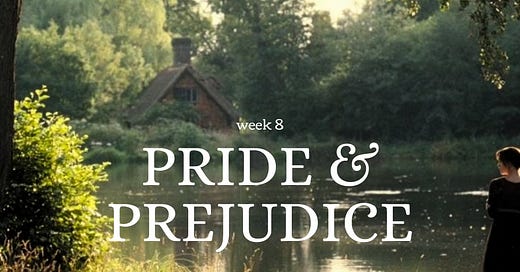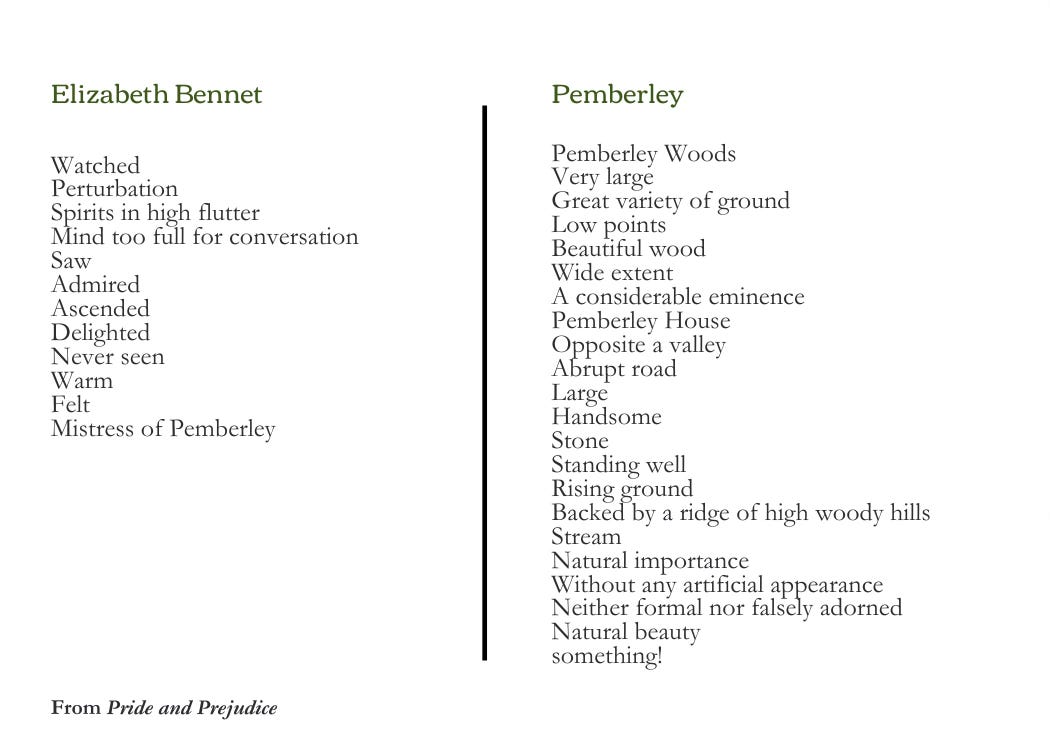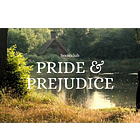"she certainly did not hate him"
Pride & Prejudice | Week 8: Vol. 3, chapters 1-6 | on Pemberley, brittle reputations, and the revenge of wicked Wickham
Welcome to the Closely Reading book club: a space where we closely read classic literature together and discuss assigned chapters each week.
This week, we’re discussing Pride & Prejudice volume 3, chapters 1-6.
Welcome to week 8 of our Pride & Prejudice read-a-long
If you have not completed our chapters for this week yet, I encourage you to do so before reading today’s guide. Please remember to avoid spoilers in the comments.
If you enjoy today’s post, consider leaving a tip.
This week, Lizzy visits Pemberley, meets Miss Darcy, and more Bennet family drama unfolds…
In chronological order, here are some highlights from this week’s reading (with new characters in bold):
Elizabeth joins her aunt and uncle, the Gardiners, on a visit to the country—and they decide to stop at Pemberley.
Darcy is home and surprises Elizabeth with how kind and warm he is toward her, despite her treatment of him.
Elizabeth experiences a change of mind and a change of heart toward him, and starts wondering if he would ever renew his proposal.
Miss Bingley and others are in attendance at Pemberley, but Elizabeth is the clear center of Darcy’s attention and interest (despite Caroline Bingley’s Regina George behavior, calculated to turn Darcy against Elizabeth).
And then everything goes to hell, thanks to Wickham.
Lydia runs away with Wickham, a decision that is ruinous for both herself and her family’s reputation.
The family scrambles to discover the depth of the couple’s chaos: have they run away to live together in sin, in Scotland? Are they in London? What was Wickham’s “design” in all of this?! (It was money. Duh.)
The family hopes they’ve married and attempts to track down the events and Lydia’s whereabouts through letters, gossip, and word from their friends in the regiment’s vicinity. Mr. Collins also inserts himself.
Mr. Bennet seems finally to recognize the role he has played in the chaos and tells Kitty there will never be an officer allowed in the Bennet home again, nor will there be any more balls. Suddenly, the business of marriage isn’t so silly or simple as Mr. Bennet has wanted Mrs. Bennet to believe.
The wonders of Pemberley abound, don’t they? Art, music, and nature come together in a stunningly beautiful portrait of Englishness and propriety — and yet, as Elizabeth notes — there is something deeply authentic about the entire space that reflects Mr. Darcy himself.
Let’s closely read the first page of Volume 3 together:
Elizabeth, as they drove along, watched for the first appearance of Pemberley Woods with some perturbation; and when at length they turned in at the lodge, her spirits were in high flutter.
The park was very large, and contained great variety of ground They entered it in one of its lowest points, and drove for some time through a beautiful wood, stretching over a wide extent.
Elizabeth’s mind was too full for conversation, but she saw and admired every remarkable spot and point of view. They gradually ascended for half a mile, and then found themselves at the top of a considerable eminence, where the wood ceased, and the eye was instantly caught by Pemberley House, situated on the opposite site of a valley, into which the road with some abruptness wound. It was a large, handsome, stone building, standing well on rising ground, and backed by a ridge of high woody hills;—and in front, a stream of some natural importance was swelled into greater, but without any artificial appearance. Its banks were neither formal, nor falsely adorned. Elizabeth was delighted. She had never seen a place for which nature had done more, or where natural beauty had been so little counteracted by awkward taste. They were all of them warm in their admiration; and at that moment she felt, that to be mistress of Pemberley might be something!
As we’ve discussed in other exercises and essays here, there are lots of approaches to closely reading. One way I’d like to try reading these paragraphs from the novel is through list-making (one of my fave things to do!). And it’s very simple.
You simply pick a few categories or ideas you’d like to track in the sections after reading it through once, and then make a list, based on each category, of the keywords that best apply to that category.
This can help you see how the language of the passage is building up to the meaning you take away from it — and it can also help you find places in your own reading impulses where you may be adding or taking away from what’s on the page in helpful (or not so helpful) ways.
There are two tensions or angles from which I want to read this passage, so I’ll be making two lists.
One about Elizabeth.
One about Pemberley.
Alright: here we go — a nice organization of terms that, throughout the passage, align to either Lizzy herself or to the characterization of Pemberley as we drive along with her through the woods, up a stately hill, and finally bring the full estate—Pemberley House—into view.
The words around Elizabeth have to do with overwhelm and experience: she’s watching and seeing, admiring and delighting — and these words also have to do with heights of feeling. She is literally “ascending” the hill toward the house, her spirits “in high flutter,” as she takes in sights and views and perspectives she has “never seen before.” This is a warming moment for Elizabeth: that temperature rise that accompanies a heartbeat, blood rushing to your face, as you experience novelty (as well as the host of other flutters Lizzy is feeling by visiting the home of a man who has expressed deep love for her, whom she has rebuffed, and then started to see in a whole new way…)
Now: for the word bank on Pemberley. It’s a bit of a word bank of Darcy himself, isn’t it? Like his home, Mr. Darcy is “handsome” and a bit stony, or stalwart, in stature. He “stands well” in rooms of great import, with such presence he’s thought proud.
But note here: Pemberley House is never proud. It emanates a “natural importance” and lacks any “artificial appearance.” It beautifully weds nature with humankind; it has no “false adornments” to render the environment gaudy or distrusted by its tenants. It is not run over with vines and growth (like Mr. Rochester’s wild home in Jane Eyre or the darkened windows of Manderley in Rebecca). Nor is it sterile and unwelcoming, like the overly showy halls of Rosings where the self-important Lady Catherine holds court.
Pemberley is, in all ways, a contrast to the looming Gothic halls of the Victorian era; there are no haunted Miss Havishams here. For despite the broken-hearted hopes of young Miss Darcy, and the recently rejected heartache of Mr. Darcy by our own heroine, the rooms are still light filled and hopeful. Music flows freely. Water flows from stream to natural pond and there is no “awkward taste” of those like Mr. Collins with their bric-a-brac, or like Lydia Bennet with her ugly bonnet, to clutter the calm, peace, and intentionality of this magnificent place.
Surely, surely this home plays a great role in Elizabeth’s shift in feeling, belief, and desire during this part of the story. And because we know she is not beholden to vanities about wealth or status, we know that Elizabeth can experience the grandeur of the home differently than the willing subjects of Lady Catherine experience her hospitality. Elizabeth, like us, sees Pemberley as a more true, and more fair, reflection of Mr. Darcy himself. It is the first place she feels that being married to Mr. Darcy may not have been such a bad thing, after all.
All of this hope, promise, and goodwill is, of course, masterfully juxtaposed with Lydia and Wickham’s chaos, which endangers all of the sisters’ happiness and future marital security. Mary reads the situation for filth, and the whole sordid affair brings this week’s reading to a screeching halt.
“Unhappy as the event must be for Lydia, we may draw from it this useful lesson; that loss of virtue in a female is irretrieveable—that one false step involves her in endless ruin—that her reputation is no less brittle than it is beautiful,—and that she cannot be too much guarded in her behaviour toward the undeserving of the other sex.”
These injustices Mary succinctly captures with her clear-eyed view of the predicament in which her family is entrenched—they are not so unfamiliar to women today, are they?
I have a few things you can try this week.
Try the exercise above with a different passage from the novel. What do your keyword lists reveal?
Revisit your notes on the first two volumes, now that we’re into the final stretch of the novel:
What has happened that you didn’t expect?
What has happened that you knew would happen?
How have your feelings about specific characters evolved?
Every week, I share my favorite sentence. And I invite you to do the same in the comments.
“She respected, she esteemed, she was grateful to him, she felt a real interest in his welfare; and she only wanted to know how far she wished that welfare to depend upon herself, and how far it would be for the happiness of both that she should employ the power, which her fancy told her she still possessed, of bringing on the renewal of his addresses.”
I don’t think it had struck me, until this point in the novel, that Elizabeth Bennet has never been loved in the way she wants to be loved. At least, not until Darcy. In this sentence—which comes at the end of a long and beautiful musing in which she tangoes with the changing throes of her emotions toward Darcy—Elizabeth realizes she does not hate him, nor resent him. She actually respects him. She esteems him. She is even grateful to him for loving her the ardent way he does.
And she begins to experience feelings of reciprocity; she wonders if, for “the happiness of both” of them, whether she can rely on his love to remain long enough that she might start to figure out how to return it.
For a young woman who was raised by a neurotic mother and an aloof father, who has perhaps very rarely seen true affection, love, and admiration modeled for her, I found this moment particularly moving.
Elizabeth, I’ll admit, had started to drive me a little crazy in the last few weeks, and I even questioned whether it was a good idea to slowly read her character—it was driving a wedge! And then I realized: perhaps that’s the point. Maybe Austen wanted to let me let Lizzy be wrong. Let her judge wrongly, let her be overly harsh. Let her be overrun with biases and prejudices.
In fact: let me, her reader, be wrong about things, too.
Then, let us ride into Pemberley together.
Let us feel those angers and fissures start to melt away.
Let Elizabeth feel something other than what she’s capable of feeling at home, surrounded by clucking and gossiping at all hours. Let her visit a place that can help her see a different view. Let her change her mind.
And what a lovely, romantic consequence: that changing her mind also means, perhaps, letting herself fall in love for the very first time.
There were no reader questions this week!
Want to submit a question for next time? Here’s the form.
WEEK 9 | Monday, March 17
Read volume 3, chapters 7-13
(Continuous chapters: 49-55)
Okay, we’re coming up on our second-to-last week! We’re almost done with Pride and Prejudice. Can you believe?!
Full schedule is available here:
Meet me in the comments
What are you enjoying most as you read the novel each week?
What are you enjoying least? Is there anything you wish was different about the story or about this experience?
What have you learned about your own close reading habits through this experience?
‘Til next time…happy reading!














Who is this Darcy that Elizabeth encounters on his home turf at Pemberly? At least the Bingley sisters are as haughty as ever, or Elizabeth might have felt she'd entered a parallel universe. There is still the problem of his role in keeping Bingley from Jane. Does Elizabeth now understand this to be the prudent act that he claimed? Austen has used prudent and imprudent as frequent descriptors, and it has seemed that some of the "prudent" actions have been more selfish or self-serving, than just sensible and wise choices. Though counter to what he's always considered prudent in the past, Darcy's attentiveness to the Gardiners, even once he knows who they are, seems to indicate that he's become more open minded since his proposal and letter. He clearly is still captivated by Elizabeth, and though she struggles to admit it to herself, she is falling in love with him. As for me, I'm starting to think past the romance to their future. Darcy would not be the only man to fall for an outspoken woman only to later try to constrain her to meet expectations. Elizabeth's role as Mrs. Darcy would be much different than anything for which she's had a good role model. Nor have the Bennets given her a good example of how to be married. Their union would definitely bring challenges. Just as the potential for romance is heating up, Elizabeth gets news from Jane that Lydia has "eloped" with Wickham. When Elizabeth blurts this all out to Darcy, I think she fails to see that she may have shared her situation with the one person who might understand most acutely. After all, Darcy did have to rescue his own sister from the duplicitous Wickham. Austen sure understands how to build tension by bringing her characters to the brink of resolution and then yanking them back with some new obstacle; and picking the end of this chapter to pause our reading has created quite a cliffhanger.
What a great section! I particularly loved the little cameo of the reactions to the Wickham debacle: Mr Collins, sanctimonious (of course); Mrs B, torn between fears of catastrophe and worries about Lydia's wedding clothes; Elizabeth, metaphorically pulling up the drawbridge ("Under such a misfortune as this, one cannot see too little of one's neighbors. Assistance is impossible; condolence insufferable. Let them triumph over us at a distance, and be satisfied"); and Mr B, with his incomparable line in cynical repentance ("Let me once in my life feel how much I have been to blame. I am not afraid of being overpowered by the impression. It will pass away soon enough"). Brilliant stuff...